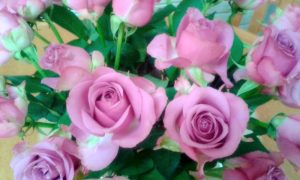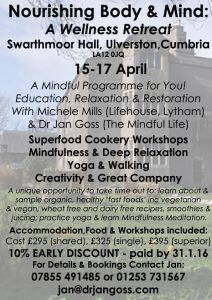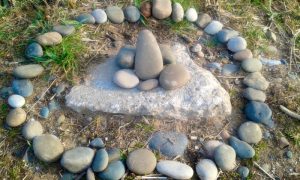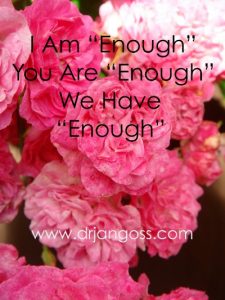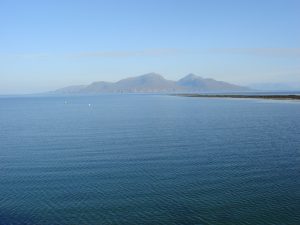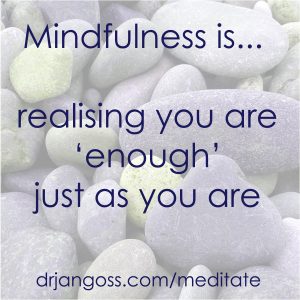Uncategorized
The Mindful Life
Entering into a new year always holds promise and expectation. It gives us the opportunity to recalibrate our life, to decide on a course of action and set out new goals and resolutions. There is often an air of optimism that pervades our body and mind, enabling us to feel confident that we can achieve something special.
If we bring mindfulness into the mix and the heightened awareness that that ensures, it means we can consciously create and construct the life we aspire to live. ‘The Mindful Life’ is a life that flows harmoniously and peacefully because we have the resilience to remain unperturbed by the many twists and turns that our life takes. ‘Setbacks’ are seen as opportunities, not in some superficial attempt to ‘think positively’, rather because we know, beyond doubt, that everything always works out. Life may not always be as we envisioned, however with the inner confidence and deep trust in our self and the process of life that comes from regular mindfulness practice, life is able to flow. As we get out of the way of life, as we sidestep our ego, and come increasingly into alignment with the flow of the present, life unfolds organically and ‘perfectly’.
True optimism comes from the confidence that ‘all will be well’ because ‘all is well’ in this moment. Through practice and over time we build and strengthen the psychological flexibility and emotional resilience that enables us to face challenges and create solutions. We become more resilient because we have developed the ‘true’, inner confidence that comes from learning to trust our self and our intuitive capacity, to ‘know’ beyond doubt, and therefore let go of ‘second guessing’ which simply confuses and obfuscates.
Eight years ago, when I first started researching and practising mindfulness I realised it was about so much more than its efficacy to ‘simply’ reduce stress and anxiety. Naturally, that is often the starting point, the point of entry, for many of us. If life is ‘comfortable’ (i.e. there is no crisis – inner or outer) we rarely seek to find deeper joy, fulfilment and flow. Developing and maintaining a calm inner landscape through the practice is pivotal to our health in general. At a physical level it strengthens our immune system, whilst psychologically and emotionally enabling us to achieve a relaxed sense that everything is unfolding perfectly, that everything is flowing. It is from this psycho-emotional state of a complete lack of anxiety and tension that we are able to flourish and enjoy life fully, in each moment.
So the practice offers us a choice. We can stop at ‘taming our amygdala’, which is responsible for the fight-flight-freeze’ response and our increased levels of stress and anxiety, or we can continue with the practice beyond ‘mere’ relaxation to experience optimum health and wellbeing, to truly flourish! The Mindful Life is a life lived to the full, where every moment, however simple is enjoyed with gratitude. When we achieve this, we truly value our body, our mind, and all of the people and events that constitute The Mindful Life!
The Gift of Time
Busy, busy, busy time of year! Even busier than normal! No time to sit and meditate…people to see, things to do, food to eat, drinks to drink, ‘treats’ to be had…meditation can wait!!
And yet, I can’t help but think that meditation is the ultimate ‘treat’. If we think of a ‘treat’ in the true context of its meaning, as treating our self (and others) with love and kindness.
Somewhere along the timeline of our lives this concept seems to have been hijacked! Often what we regard as a ‘treat’ is something that we limit because we know it isn’t good for us, or because we feel guilty about indulging ourself. So no matter how much we are told ‘we’re worth it‘ there is a part of us that really, deep down doesn’t feel that is true.
Mindfulness helps us to see through all of that and get to a place where we can really care for and ‘treat’ our self, body and mind, with appreciation and respect, taking quality time out to get beyond the surface, to understand our real needs and what is really nourishing. It may require a bit of swimming against the cultural and/or familial tide which can initially feel uncomfortable, but once we gain the confidence to be true to our self and our own needs, whilst balancing that with the needs of others, we feel a whole lot happier and our health and wellbeing flourishes!
Talking of swimming against the cultural tide, I’ve recently been working with a female engineer (I know this is becoming more common, but it wasn’t when Eileen started out). We met through a mutual business contact who was starting a new venture and we had both decided to share some of our time and skills with the project. A few meetings in and whilst out walking, Eileen and I got talking about mindfulness and our respective practices and the merits and limitations of mindfulness apps. We both agreed that they can be a good starting point, but that they are limited by their ‘virtual’ nature. Of course, ‘virtual’ means ‘almost, nearly, not quite’ and that is telling. The difference between a live and a recorded meditation is similar to the difference between listening to a CD (!) and being at a concert. There is an energy that can only be partially captured in a recording. Also, in the case of learning meditation we can’t ask an app the questions that inevitably arise in response to our practice, that requires someone who has deep understanding based on a robust personal practice.
Eileen decided that she wanted to “invest in her mind” (I love that someone actually thought that!) and we worked together over eight weeks, coaching, mentoring and practising. She commented on the depth of the meditation compared to the ‘app’ experience and started to experience shifts taking place in her life as a result. She says:
“On the surface, my sessions with you might seem like “just” a really nice involved chat with someone with whom I have made a connection…However, through the sessions and the explorative nature of the discussions I have become much more in tune with some of my inner self. I had felt lacking in established core values – or rather a set of guiding principles – and the discussions revealed that I only needed one – that of being authentic…The effect has been more than that of a more balanced and happier outlook – good things in themselves – I have now re-evaluated my direction and choices – with the end outcome of having just started a new job after a long period of (self) unemployment” (printed with permission).
Eileen had a trust and self-compassion that enabled her to invest in her self, not because she felt ‘broken’ but because she really understood what it means to feel ‘you’re worth it’.
I too, have invested ‘heavily’ in my own practice this year, taking time out to be on retreat, in addition to my daily practice and my mentoring programme for lay ordination. I have gone deeper into my self to breakthrough some of my own limiting beliefs and behaviours, to deepen my own healing process and access a deeper more consistent state of inner peace. Inevitably this has had a beneficial effect on those I guide, mentor and coach. Much has been written in leadership literature about ’emotional contagion’ (the emotional effect we have on one another) and the transmission of ‘mood’, and this is essentially what happens when I guide a meditation – there is a transmission of positive and peaceful energy takes place. So the more hours I invest in meditation, the greater the benefits for those I work with.
Each of us can generate more of this energy within our self and this can be our gift to those around us, our positive contribution to the world. The first step to achieving this is to give our self the gift of time…
Fireworks, Friends & Loneliness
Last night I watched fireworks for the first time in a long time, on Bonfire night. I spent time with family and connected with new friends. The fireworks as spectacular as they were, came and went so quickly. All pop and fizz, alluring…and oh so impermanent! ‘Don’t hold on to them’ I reminded myself…’be fully in each moment’…’remember that they will come and go!’
I realised that if I could really be there with the fireworks in the moment and savour each spark, each colour, each twist and turn, not holding on too tightly, but watching them come and go in their own time, I could enjoy them so much more. I think I have probably had a hiatus from firework watching because my expectations in the past have been unrealistic and so I have often, to a large extent, been disappointed.
The metaphor for life doesn’t escape me (or you probably!) unnoticed. It serves as a great reminder of how life is, of how our expectations impact our experience of life. People, events, ‘highs’ and ‘lows’, feelings and sensations, the breath…they all come and go, changing from moment to moment. I was so much more aware of managing my expectations of the fireworks yesterday and I feel that this is indicative of the more measured way that after seven years of daily mindfulness practice, I manage the ebb and flow of people, experiences and expectations in my life.
I had a great October – two retreats, one I co-facilitated and one where I was ‘retreating’. Managing the potential ‘dip’ in our mood as we return to our everyday life after a holiday or a retreat is something we need to be aware of – although there is usually an uplifting resonance that stays with us following on from a retreat. Both retreats served to remind me of the preciousness of connecting with our self and others in an authentic way, allowing our self and our heart to be open, allowing our self to be ‘vulnerable’ in the safety of a nurturing space.
November too, has been benevolent, so far. I attended a Day of Mindfulness in Lancaster practising in the tradition of Thich Nhat Hanh. Taking a day out in this way, to reconnect with our practice and others always feels nourishing. I also had the pleasure of attending a music/storytelling event organised by a dear friend and offered by Empty Hands Music aka Nimo Patel, who has been ‘on tour’ since May this year sharing his music (for free) and inspiring stories of ‘serving’ people in India over the past 6 years.
After the event I was invited for a beautiful vegan meal and spent time getting to Nimo and his fellow travellers, talking, eating, meditating and generally being outrageously happy in the present moment. Such kind, open-hearted and inspiring people, it was a privilege to be in their company. I was taken by how easy it is to bond deeply when everyone is defence-less and open-hearted, and how effortlessly we can create community. I don’t think anyone wanted the evening to end but we didn’t hold on too tightly, and we eventually let it go around midnight.
Managing the letting go of people, experiences, and the associated feelings that we have, is a big part of practising mindfulness. The ability to let go with a minimal amount of discomfort or pain (or none) is the fruit of our practice. Over time we become more emotionally adept and more emotionally resilient, less swayed by the ebb and flow of life, as we remain increasingly centred in our body, in the present moment. We don’t hold life so tightly, we allow it and our self to flex and flow, knowing that everything changes and that everything will work out. It always does, when we let it. We learn too, to let go of the fears that drive our clinging behaviours, in order to come to a point of accepting and eventually embracing, life’s inevitable challenges. And if we persist in facing life, rather than distracting our self in an attempt to push the unpleasantness away, we begin to understand that treasure lies in the ‘difficulties’ we face.
Recently, I was witness to a person sharing their experience of recognising and holding their loneliness. I have thought a great deal about the courage this took to express, and the strength of practice it takes to identify that, and then be ok with it, not attempting to push it away or cover it up through some form of consumption. Being able to sit with our loneliness knowing that it is a part of life and that it won’t last forever, knowing that there will always be fireworks and friends around the corner, is the very essence of mindfulness. When we understand this, we can enjoy each moment of our daily life because we have let go of judging, of clinging, of wanting things to be other than they are right now. Only then are we in a position to truly appreciate our life.
Keeping it Simple
Surely life isn’t meant to be as busy or complicated as we make it. I can remember going to Wales a few years ago and noticing the difference in the way people (generally) approached life – a bit of painting here and there, sitting in the garden drinking tea, taking time to chat with people in the street – there was a mindful quality to life and people had time for one another, there was a great sense of community combined with a lack of urgency. People seemed more at peace with themselves and the world.
That is in stark contrast to a comment a friend made on the pace of life in London, when he visited recently: ‘they all look like they are 10 minutes late for wherever they are going!’ He’s got a point and I know when I’m in London it is so easy to get caught up in that frenetic pace of life. Mind and body racing in unison!
When we take the time to move more slowly, more mindfully, in a considered and attentive manner, our mind slows down too – mind and body are not separate entities as Descartes’ legacy would have us in the West believe. They are truly connected, intimately intertwined and how we treat one, inevitably affects the other. Rushing physically, perpetuates a busy mind and the worldview of scarcity and lack that goes with ‘not having enough’ (time, money etc). We regard time, like we regard money – we spend it, save it, squander it and invest it. If we are not mindful of our actions we can get caught in a cycle of chasing after time, which just results in us feeling depleted. Whereas when we ‘take’ our time, it is as if time itself slows down and we connect more fully with the joys of the present moment.
Our global obsession with consumption is also a mark of the attitude of paucity that prevails. We chase after the material to fill the “spiritual” void as though it will solve all of our problems and ameliorate our existential crises, as though we will feel better about our self with that new [fill in the blank]. Being mindful means being mindful of what and how we consume too, it isn’t just about the breath, it is considering the impact we have not only on our own body and mind, but also on other beings and the Earth.
Practising mindfulness gives us the break from routine that we need to see things from a different, calmer, more abundant perspective. It enables us to see that we are enough, and have enough. It enables us to enjoy what we have, rather than chasing after something more, whether that is consumer goods, relationships, qualifications or experiences. An ‘attitude of gratitude’ and appreciation is only really possible when we stop hankering after something more and feel content with what we have.
Letting Go
I’m reading a great book by David Hawkins PhD, entitled Letting Go: The Path of Surrender, in which the author manages to balance his experience as a psychiatrist and practising psychotherapist with spirituality – I continue to recommend it to anyone and everyone who is ‘serious’ about their personal development.
The theme of letting go has been a prominent one for me this year, as a number of surprises have presented themselves. A week-long retreat I attended in August seemed to focus on that subject too – it seemed that the monastics leading the retreat were, at times, talking specifically to me! I know from my work with clients that it is a process that most of us confront and often struggle with, as we transition from one scenario to another, both in personal and professional contexts.
The work of letting go is ongoing and requires us to be flexible, creative and resilient if we are to make change as painless as possible for our self and those we are in relationship with. As part of the process of change, gaining greater understanding of ‘letting go’ is inevitably going to be helpful in transitioning more effectively through change, so that we are able to approach the next phase of life peacefully, with acceptance.
A strong mindfulness practice ensures that we are able to transition smoothly, because as part of the skills set that it helps us to develop, we learn the art of letting go. Letting go comes from the acceptance that we learn to develop through the practice of being non-judgmental, through the simple act of repeatedly refraining from making judgments of our self, our thoughts, and our ability to practice. Not judging the sound of a siren, car alarm, barking dog, or angry neighbour for example, as we sit and meditate, we are in turn letting go of judgemental behaviour by allowing those neural pathways to weaken, and in turn reinforcing the pathways of ‘non-judgment’ in our brain, we automatically develop the skill of acceptance.
Acceptance is the inevitable outcome of not judging, and letting go of the negative thoughts and behaviours we harbour and exhibit is the basis of learning to let go. When we increase our capacity for this, life becomes less of a struggle and strain, we let go of ‘trying’ and move into a more peaceful state of mind and we experience greater synchronicity. Life flows, only as we let go of resistance.
Making Time to Rest
August is often a time to sit back and relax a little, to take time out from our usual routine, to slow down and reconnect with our self, others, and life in general.
For many people, myself included, being self-employed brings peaks and troughs in work and summer in particular is quite often a time when space opens up. We have choice, of course, with what we choose to ‘do’ in that space. Whether we allow our self to ‘be’ is largely dependent on our state of mind and that is true for all of us, however we ’employ’ our time!
Giving our self time to rest is fundamental to our physical, mental and emotional health. Allocating time for ‘formal’ mindfulness practice on a regular basis is every bit as beneficial to our overall health as eating, sleeping and exercising. As we learn to connect with a state of deep, or total relaxation through meditation, every cell in our body relaxes and expands and begins to function more efficiently. As we let go of the tightness and tension that we hold in our bodies as a result of unhelpful thinking, our inner and outer life begins to change for the better.
We often seem to undervalue the benefits of deep relaxation, and see it as an optional extra, a luxury, rather than being fundamental to a healthy life. If that is so, we can re-educate ourself through our practice, gently taking time to allow body and ‘mind’ to unfurl, centre, and clarify. Letting go of filling every waking moment with some ‘distraction’ or another, we are able to yield to the space and simply be.
Kindness is the very basis of mindfulness and as it is with all other aspects of the technique, it is essential to practice it. So, be kind to your self this month, allow your self to rest when you need to. Take time out of your schedule for deep connection with your self, others and nature.
Personal Development & Bees!
I decided towards the end of 2014 that I would apply to receive The Fourteen Mindfulness Trainings from Thich Nhat Hanh, to become a lay member of the Order of Interbeing. I am extremely grateful that I was accepted and that I am able to undertake the journey, which involves a process of mentoring, practising, reading, retreating and community building, in order to strengthen my mindfulness.
I had felt for some time that I was ready to embark on the next stage in my personal development, to develop a deeper understanding and commitment to living mindfully. To date, the ongoing process has been challenging, rewarding, enlightening and joyful, in equal measure – and ultimately a commitment that I am delighted to have made. Indeed, my life changed in many ways as soon as I expressed my intention to commit to living in accordance with the trainings. This reminded me of the power of intent, the power of our thoughts, and the importance of being mindful of where we direct our focus.
As part of the journey I have made a conscious decision to live more ethically and one of my mentors opened that door for me through an introduction to Ethical Consumer Magazine . That in turn has given me a greater understanding of the choices I have and the influence that I have as a ‘consumer’. I realise that anything I choose to purchase from ‘fuel to food’ has an impact on countless other ‘beings’ and so now I am happily equipped with the knowledge to make informed choices, that support ethical businesses, practices and services.
I share much of this information on Facebook and Twitter – especially campaigns and petitions for example: to boycott Shell fuel stations – as a stand against their intention to begin drilling in the Arctic for oil this summer – you can sign the Greenpeace petition here if you wish to voice your concern; and also to help save the bees from dangerous pesticides that are threatening their survival and being sprayed on our food crops (if we don’t choose organic) – you can sign the Greenpeace petition here.
Mindfulness & Love
Thinking about ‘love’ and what it means ‘to love’ seems to be an appropriate topic for my February Newsletter! It will be interesting to get your feedback, I am always delighted that people take the time out of their busy schedules to let me know whether my writing has been helpful in some way…
Culturally, we are fed popular notions of romantic love, either the ‘happy ever after myth’ – the Disneyfication of love, or the myth that love is commensurate with pain and suffering, as is often portrayed in popular songs: ‘Is it desire or is it love that I’m feeling for you? I want desire ’cause your love only gets me abused’. In reality, love can only ever be kind and joyful, it is our ego-centric attachment that causes us pain!
In a Buddhist context, love has been defined clearly as an altruistic state, ‘a mind wishing to make another person happy’. It is about what we can give, not what we can take. Zen teacher Thich Nhat Hanh clarifies that the four components of true love are ‘loving kindness’, ‘compassion’, ‘joy’ and ‘inclusiveness’. There is no mention of the emotional and psychological pain referenced above, and it is clearly not a derivative of desire!
Mindfulness is…a mind that generates love and the confidence to express it. As we sit in mindfulness we learn to ‘fall in love’ with our self through the ‘repetition’ of practising the core skills of non-judgment, acceptance, patience, and appreciation, making it easier to open our heart to others: to give and receive love.
Love is only possible when we let our defences down and allow our self to be truly ‘vulnerable’. Indeed, vulnerability combined with the emotional resilience that mindfulness fosters, means that we can be more loving with more people, more of the time. Love is expansive, infinite and inclusive and we can open our hearts to all when we are not fearful of the ‘repercussions’, when we know we have the inner resources to support us and we are not fearful of being hurt or ‘abused’, when our priority is giving, not receiving.
Mindfulness practice provides us with an opportunity for our defences to fall away, for us to experience greater inner peace, healing (making whole), and self-love, as body and mind align with the present. When we have experienced this, we are free to love infinitely and ‘truly’…
Mindfulness Retreat, Isle of Muck, Inner Hebrides, Scotland. Next Retreat 2-9 May £350/£450 – all inclusive
An opportunity to take time out, to relax, reflect and regenerate in Nature, through the practice of being mindful in all that we do – this is a small retreat suitable for beginners and the emphasis is on nurturing our self. Julie attended the retreat on the Isle of Muck in September last year – this is her account of the week, which you may find interesting:
“I felt my week spent on the Isle of Muck was such a fulfilling experience.
With the twice daily meditations in early morning and evening and an hour of deep relaxation in the late afternoon each day, it really felt like time away from the business of life.
With peace, calmness, nature and stunning scenery all around, it really felt like time to unwind and time to look a little deeper into myself.
With some free time in the morning after breakfast, I would stroll down to the seal colony and watch the older seals basking in the sunshine and the younger ones playing in the sea.
On other days I would sit on the beach writing my journal with two friendly horses for company, one even lying down in the sand next to me, relaxing in the sunshine.
We would discuss our journals before lunch and after tea each day in a supportive and relaxed manner looking into our experiences on the Island and other things that came up.
We would take turns to cook lunch (under Jan’s watchful eye!) and a big pot of soup in the evening. Such amazing food every day and then washing up mindfully!
Not only did the Raeburn keep us warm, it was also great for baking soda bread, banana bread and baked potatoes.
As the week went on, we would have silence for part of the morning and then at lunchtime, making us more aware of our food, the care that was taken in preparing it and really tasting it.
Just doing one thing at a time, slowing down and appreciating all that was around, listening to the birds singing at tea time in the garden, walking mindfully on the beach of white sand and gazing up at the stars in the clear night sky.
Going home with more understanding of myself, more experience of meditation and mindfulness, also taking home feelings of peace from the retreat and some wonderful memories.” (Julie, September 2014)
EVENTS
Events:
Mindfulness Workshops Lytham – 10am – 4pm (£45): an opportunity to gain deeper understanding, through theory and practice – suitable for beginners, the curious, and established practitioners (we can always learn more!!). These workshops have proven to be a real turning point for participants in terms of understanding the principles of the practice and how mindfulness can be of practical benefit in everyday life. The workshops are informal and intimate – numbers are limited to 10 people ensuring everyone has the opportunity to ask the questions they want to. Some people attend these workshops on a regular basis to refresh their practice and deepen their understanding.
Mindfulness Practice Mornings – First Saturday of each month 10am – 1pm (£25): an opportunity for group practice – suitable for those with a grounding in the practice (e.g. having attended a one-day course, or the Wednesday meditation sessions)
Wednesday Mindfulness Meditation – each week at 1pm, 7pm & 8pm (£5): an opportunity to practice each week with a group of mindfulness practitioners – these sessions last approximately 45 mins-1 hour and the groups at 1pm and 7pm are suitable for beginners. Booking is essential. These sessions enable us to ‘stay on track’ with our practice and to practice with others, which usually enables us to go deeper into the practice/present moment.
Mindful Living Retreat – The Isle of Muck, Inner Hebrides, Scotland (£350/£450) 2-9 May 2015: an opportunity for deep immersion in the practice, to really experience the benefits. The cost includes accommodation in shared rooms, all tuition and food (there is a requirement to bring some of your own food – but most of the food will be provided). Again, this will be a small and intimate group of 9 people (maximum). There will be guided meditations, indoors and out, and time to enjoy the tranquility of the island, to reflect, relax and rejuvenate. It is suitable for beginners and those who already practice – we will begin the week by transitioning into island/communal living, going deeper into the practice and the present moment as the week progresses. Living mindfully with others enables us to remind and be reminded of the practice 24/7, so that we bring presence and compassion to all that we engage in during the retreat.
Please contact me for more information or to book: jan@drjangoss.com
Mindfulness is…realising there is more to life than meets the eye
When we practice mindfulness meditation regularly, that is, when we sit and practice the formal meditation, we begin to notice very subtle shifts taking place in our self and in our life. The principles that we practice are in fact highly transferable skills that migrate into all ‘corners’ of our daily life: the way we speak with friends (and strangers!); the way we brush our teeth; the way we choose the food that we will consume – where it has come from, the benefits of eating it, and the impact it has on our whole bodily system; and what we pay attention to!
With a greater capacity for mindfulness we inevitably see the bigger picture, the causes and their effects, and our part in their creation. We begin to see how our thoughts and decisions contribute to our experience. This is empowering because with this understanding we can make more informed choices and take more responsibility for what we are creating and the impact that has not only on our own life, but the impact it has on the lives of others and the environment. In effect, mindfulness empowers us to take back the ‘control’ of our life – by harnessing our thought-power.
We can use this power to enable greater physical health, psychological wellbeing, and emotional resilience: to really begin to see life in all it’s glory from a more informed and wisdom-fuelled perspective. We can ‘open the door to life’, to living dynamically and healthily, by training consistently in the practice. By honing our skills on a regular basis we see so much of what was hidden to us previously and increasingly we begin to embrace life in all its guises.
Even attending a one-day workshop can provide a great insight into the practice and the benefits mindfulness ‘brings to life’. I see great change in people over the course of a day-long workshop, they leave looking more relaxed, fulfilled and accepting – and therefore less stressed and resistant to life.
Please email me for more details jan@drjangoss.com – or call 01253 731567 or 07855 491485
Mindfulness Events
“Just wanted to say a big thank you for Saturday. The workshop was great and it was incredible how much lighter I felt afterwards” (Participant)
“Empowering, enlightening, comforting, powerful, overwhelming and intriguing. Wonderful experience, thank you!” (Participant)
Group work provides an opportunity to take ‘time-out’: to learn, reflect & connect.
These workshops bring together small groups of about 10 people. The workshops are suitable for all, beginners and established practitioners alike, and provide an opportunity to:
- begin or continue practising mindfulness meditation
- learn more about mindfulness techniques and their benefits
- engage in some reflective time
- unwind and relax
- to reconnect with oneself and connect with others in a meaningful way
Events:
Introduction to Mindfulness – Saturday 27 October, Lytham – 10am – 4pm (£45): an opportunity to gain deeper understanding, through theory and practice – suitable for beginners, the curious, and established practitioners (we can always learn more!!)
Mindfulness Practice Mornings – Saturday 4 October; Saturday 1 November; Saturday 6 December 10am – 1pm (£25): an opportunity to refresh and deepen understanding of mindfulness through group practice
Wednesday Mindfulness Meditation – each week (except 17 September) at 1pm, 7pm & 8pm (£5): an opportunity to practice each week with a group of mindfulness practitioners – these sessions last approximately 45 mins-1 hour and the groups at 1pm and 7pm are suitable for beginners. Booking essential.
Mindful Living Retreat – The Isle of Muck, Inner Hebrides, Scotland (£450/Concessions available): an opportunity for deep immersion in the practice, to really experience the benefits – suitable for all. The cost includes accommodation in shared rooms, all tuition and food (there is a requirement to bring some of your own food – but most of the food will be provided).
Please contact me for more information or to book: jan@drjangoss.com

